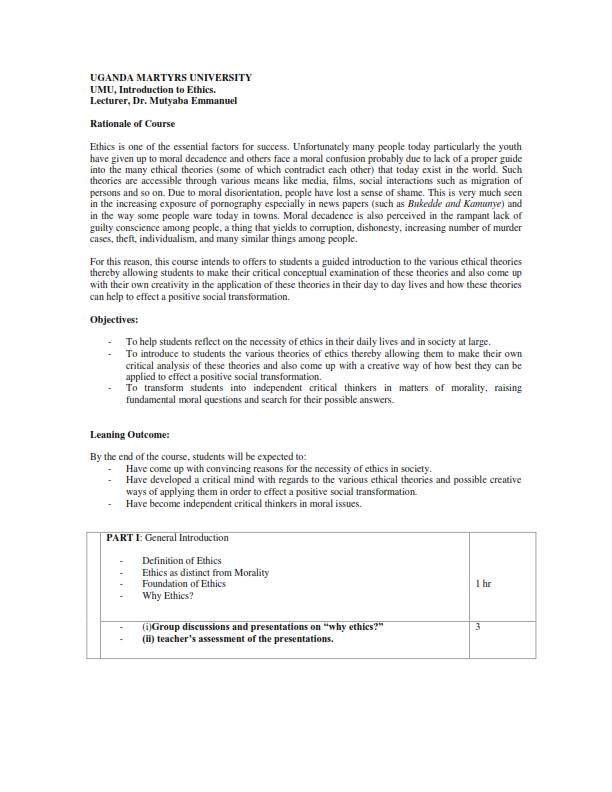- Teacher: Martin Kubanja
- Student: WASSWA ANDREW
- Student: Maikula Andrew Matendo
- Student: Moses Asobora
- Student: Patricia Atukunda
- Student: Colline Banga
- Student: Mark Bogere
- Student: Ssebatta Bruno
- Student: Nagawa Catherine
- Student: Senkooto Davis John
- Student: Tusingwire Denis
- Student: ebawi emmanuel
- Student: Namulema Gonzaga
- Student: GERTRUDE GUMOSHABE
- Student: Odong Jaspher
- Student: Masereka John
- Student: Kamya Joseph
- Student: Paul kasule Kato
- Student: Merdi Kimuha
- Student: Martha Komuhangi
- Student: Alex Kyanda
- Student: Peter Lubowa
- Student: NAYIGA MATILDA
- Student: Daniel Mukuye
- Student: Henry Mulumba
- Student: Agnes Nalubega
- Student: toko Robert
- Student: Kasasa Ronald
- Student: Rogers Simkoko Hashim
- Student: Brian Ssembuya
- Student: Nicholas Ssempijja
- Student: Primrose talunga
- Student: Trinity Frances Tushabe
- Student: Nassanga Vanessa
- Student: Lutaaya Yusuf
- Student: Peter Zimwanguyizza
- Enrolled students: 35
- Teacher: Martin Kasenge
- Student: WASSWA ANDREW
- Student: Maikula Andrew Matendo
- Student: Moses Asobora
- Student: Colline Banga
- Student: Mark Bogere
- Student: Nagawa Catherine
- Student: Ayebare Hector
- Student: Odong Jaspher
- Student: Peter Kaliisa
- Student: Paul kasule Kato
- Student: Merdi Kimuha
- Student: Martha Komuhangi
- Student: Alex Kyanda
- Student: Diana Kyaringabira
- Student: Daniel Mukuye
- Student: Henry Mulumba
- Student: Keith mulungi
- Student: Agnes Nalubega
- Student: Alinaitwe Nicholas
- Student: Nabuguzi Proscovia
- Student: toko Robert
- Student: KISITU RONALD
- Student: Rogers Simkoko Hashim
- Student: Primrose talunga
- Student: Trinity Frances Tushabe
- Student: Nassanga Vanessa
- Student: Lutaaya Yusuf
- Enrolled students: 27
Welcome students to the Fundamentals of Networking course unit! In this course, we will be diving into the exciting world of networking and learning how computers and other devices connect and communicate with each other.
- Teacher: Justine Nassolo
- Student: MZUANDA ALVIN
- Student: ABEINE EDGAR
- Student: BIRUNGI EMMANUEL
- Student: AYEBARE MARK
- Student: Christine Nakyejwe
- Student: KIZZA REGINAH
- Student: Francis Rutatina
- Student: KUSIIMA SARUAH
- Enrolled students: 8
- Teacher: Andrew Ssemwezi
- Student: Matrona Ainomugisha
- Student: TUMWEBAZE ANDREW
- Student: WASSWA ANDREW
- Student: Maikula Andrew Matendo
- Student: Blessed Ankunda
- Student: Moses Asobora
- Student: Colline Banga
- Student: Victoria Birungi Sophie
- Student: Mark Bogere
- Student: Nagawa Catherine
- Student: Senkooto Davis John
- Student: BIRUNGI EMMANUEL
- Student: Nanono Flavia
- Student: Namulema Gonzaga
- Student: GERTRUDE GUMOSHABE
- Student: Nalwanga Hafusa
- Student: Odong Jaspher
- Student: Masereka John
- Student: Kamya Joseph
- Student: Paul kasule Kato
- Student: Merdi Kimuha
- Student: Martha Komuhangi
- Student: Alex Kyanda
- Student: Diana Kyaringabira
- Student: Peter Lubowa
- Student: Martin Lule
- Student: NAYIGA MATILDA
- Student: Daniel Mukuye
- Student: Henry Mulumba
- Student: Sylivia Nakato
- Student: Barbra Nakazzi
- Student: Agnes Nalubega
- Student: kevin Namatovu
- Student: Aggrey Onyango
- Student: toko Robert
- Student: Mugisha Roland
- Student: Kasasa Ronald
- Student: Nalwadda Sandra
- Student: Rogers Simkoko Hashim
- Student: Brian Ssembuya
- Student: Nicholas Ssempijja
- Student: Vicent Ssenkumba
- Student: Primrose talunga
- Student: Trinity Frances Tushabe
- Student: KATEREGGA TWAHIRI
- Student: Nassanga Vanessa
- Student: Lutaaya Yusuf
- Student: Peter Zimwanguyizza
- Enrolled students: 48
This course offers a guided introduction to the various ethical theories thereby allowing students to make their critical conceptual examination of these theories and also come up with their own creativity in the application of these theories in their day to day lives and how these theories can help to effect a positive social transformation.The topics of the course are: theories of ethics, various approaches to the theories and approaches ethic, and guided group discussions on the rationale and the applicability of those theories and approaches in ways that effect personal and social transformation.
- Lecturer: Mutyaba Emmanuel Musoke
- Student: Mark Ampire Kamugisha
- Student: Maikula Andrew Matendo
- Student: Fiona ANGUCIA
- Student: Alok Annabelle Elaine
- Student: Moses Asobora
- Student: Joshua Atwine
- Student: Robert Bada
- Student: HENRY BALIRE
- Student: Colline Banga
- Student: Mark Bogere
- Student: Mwaka Caleb
- Student: Nagawa Catherine
- Student: AKETO DANIELLA
- Student: Makiika Eunice Kayinza
- Student: Nalwanga Hafusa
- Student: Badashonderana Elisée Hekima
- Student: Odong Jaspher
- Student: Kamya Joseph
- Student: Peter Kaliisa
- Student: Serena Kamagaju Pearl
- Student: Paul kasule Kato
- Student: Martha Komuhangi
- Student: Atusiimirwe Leah Shevon
- Student: Nyalundja Mike
- Student: Nyalundja Mike
- Student: Daniel Mukuye
- Student: Henry Mulumba
- Student: Hanisah Nabasajji Suubi
- Student: Solome Nakazzi Julian
- Student: Agnes Nalubega
- Student: kevin Namatovu
- Student: MARSHAL DANIEL P'LAULA
- Student: Nakure Pacific
- Student: PARIYO PONYANO PRESCORT
- Student: toko Robert
- Student: Mugisha Roland
- Student: Mulengezi Samuel
- Student: Nabuuma Shanis Kiwanuka
- Student: Rogers Simkoko Hashim
- Student: Vicent Ssenkumba
- Student: Primrose talunga
- Student: Trinity Frances Tushabe
- Student: Robert Unega
- Student: Ruth Uwera Michelle
- Student: Nassanga Vanessa
- Student: Amutuhaire Vanessa Tracy
- Student: Peter Zimwanguyizza
- Enrolled students: 47
Ethics_1 Introduction to Ethics sem1 2020
This course, Introduction to Ethics, is meant to introduce university students into the world of ethics. The course defines ethics as an academic study that cuts across all areas of study. Furthermore, the course broadly explains the subject matter of ethics, treats some of the fundamental concepts that students should be familiar with, and highlights the basic ethical trends that comprise the study of ethics today.
- Lecturer/Facilitator: SAFARI PETER CELESTINE
- Student: George Byarugaba
- Student: Hatangimana Gilbert
- Enrolled students: 2
- LECTURER: Nanteza Babirye
- CO-TEACHER: Nagawa Violet
- STUDENT: WASSWA ANDREW
- STUDENT: Fiona ANGUCIA
- STUDENT: Blessed Ankunda
- STUDENT: Moses Asobora
- STUDENT: Jonathan Atuhaire
- STUDENT: Patrick Ayesiga
- STUDENT: Colline Banga
- STUDENT: Mark Bogere
- STUDENT: Nagawa Catherine
- STUDENT: Tusingwire Denis
- STUDENT: BIRUNGI EMMANUEL
- STUDENT: Nalwanga Hafusa
- STUDENT: Namata Irene
- STUDENT: Odong Jaspher
- STUDENT: Oworukiri Jolly
- STUDENT: Kamya Joseph
- STUDENT: Peter Kaliisa
- STUDENT: Paul kasule Kato
- STUDENT: Merdi Kimuha
- STUDENT: Martha Komuhangi
- STUDENT: Alex Kyanda
- STUDENT: Santrinah Kyarikunda
- STUDENT: Diana Kyaringabira
- STUDENT: NAYIGA MATILDA
- STUDENT: Daniel Mukuye
- STUDENT: Henry Mulumba
- STUDENT: Keith mulungi
- STUDENT: Prisca Nabagereka
- STUDENT: Agnes Nalubega
- STUDENT: kevin Namatovu
- STUDENT: Jacent Jacintah Namuyomba
- STUDENT: Nabirye Patricia
- STUDENT: Turyagyenda Pauline
- STUDENT: PARIYO PONYANO PRESCORT
- STUDENT: toko Robert
- STUDENT: Mugisha Roland
- STUDENT: Kasasa Ronald
- STUDENT: Mulengezi Samuel
- STUDENT: Rogers Simkoko Hashim
- STUDENT: Paphuladito Ssemmanda
- STUDENT: Vicent Ssenkumba
- STUDENT: Primrose talunga
- STUDENT: Trinity Frances Tushabe
- STUDENT: Robert Unega
- STUDENT: Nassanga Vanessa
- STUDENT: Lutaaya Yusuf
- Enrolled students: 49
This course unit introduces students to object oriented programming using C++ a programming language which supports object-oriented programming. Learners are expected to use the c++ language concepts to design, code, compile, run, debug C++ programs. The computer system is considered to be the key tool in this course unit and each learner is expected to have a computer. The course is divided into seven chapters. Chapter 1 focuses on the introduction, Chapter 2 presents an overview of the concepts/ principles of Object-oriented programming, Chapter 3 is about C++, C++ language concepts and writing c++ programs. Learners will use the concepts introduced in this chapter to write moderate c++ programs or software solutions, Chapter 4 is Loops and Decisions- Learners will apply the concepts presented in this chapter to write intelligent programs or software solutions, Chapter 5 introduces Functions- Learners will use functions to improve their programs. They will use functions to create software solutions or programs capable of performing multiple tasks, Chapter 6 presents- Objects and classes- learners will be able to write programs or software solutions with classes, Chapter 7 introduces the concept of arrays. Learners will be able to incorporate arrays in their programs or software solutions. Mode of Delivery Lectures Practical sessions Discussions and presentations Mode of Assessment Assignments, tests and group work with pass mark of 50% A written theoretical final examination pass mark of 50% A practical final exam pass mark 50%
References C++ Programming from Problem analysis to program design D.S. Malik 7th Edition , C++ for Beginners a Beginner’s guide by Ray Yao
- Teacher: Peter Kalema
- Student: WASSWA ANDREW
- Student: Maikula Andrew Matendo
- Student: Blessed Ankunda
- Student: Moses Asobora
- Student: Colline Banga
- Student: Mark Bogere
- Student: Nagawa Catherine
- Student: Senkooto Davis John
- Student: Nalwanga Hafusa
- Student: Odong Jaspher
- Student: Kajobe Josephine
- Student: Paul kasule Kato
- Student: Merdi Kimuha
- Student: Martha Komuhangi
- Student: Alex Kyanda
- Student: Diana Kyaringabira
- Student: NAYIGA MATILDA
- Student: Daniel Mukuye
- Student: Henry Mulumba
- Student: Maria Nakazzi
- Student: Agnes Nalubega
- Student: kevin Namatovu
- Student: Jacent Jacintah Namuyomba
- Student: toko Robert
- Student: Mugisha Roland
- Student: Kasasa Ronald
- Student: Rogers Simkoko Hashim
- Student: Brian Ssembuya
- Student: Vicent Ssenkumba
- Student: Primrose talunga
- Student: Trinity Frances Tushabe
- Student: Nassanga Vanessa
- Student: Lutaaya Yusuf
- Student: Peter Zimwanguyizza
- Enrolled students: 34




